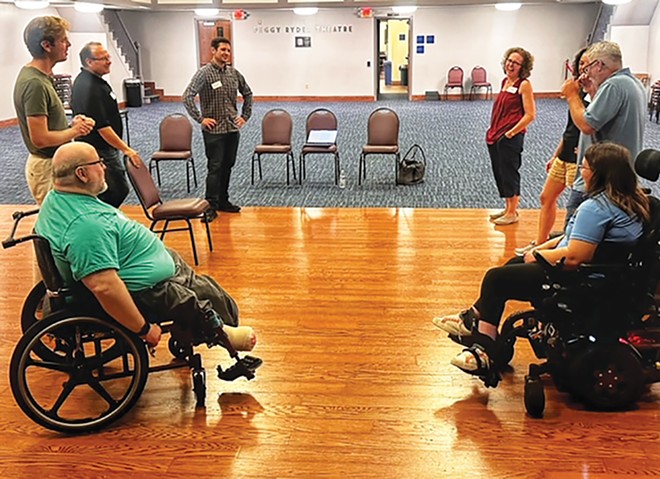
I showed up to a recent Capital City Improv workshop at the Hoogland Center for the Arts without realizing I would be a participant. I've never done improv before and hadn't planned on it. As a writer, I like to meticulously edit my work, then edit again, then stare at it with existential dread and edit one more time before putting out anything funny into the world. Improv is nerve-wracking for someone like me.
I am also a person with a hidden disability, which influences most of my daily decisions – definitely any regarding performing. Once it was clear I was participating in the group and not just writing about it, my heart rate escalated and every part of my body began to sweat, but I am an entertainer at heart. I persevered, had some good laughs and lived to write the tale.
Our Stage/Our Voices, a program of the UIS Performing Arts Center, provides opportunities such as this one for artists who are part of historically underrepresented communities including BIPOC, LGBTQIA+ and persons with disabilities to address issues of inequality in the performing arts. Its objective is to achieve more diversity and inclusion in the regional art world. The workshop series was developed through this program.
Steve Sykes, the 2024-2025 artist-in-residence for the program, hopes to elevate the voices of and increase opportunities for the disabled community to enjoy and participate in theater. He partnered with Capital City Improv to develop this open platform improv workshop experience.
"It is a good way to dip a toe into the water of performing. Improv is a format that's really conducive to accessibility, plus it's fun," said Sykes.
CCI troupe member and Chatham Mayor Dave Kimsey helped to lead the workshop. He said the workshop for persons with disabilities is not that different than the regular CCI group.
"Improv is its own artform. So many improv tools and techniques translate well into everyday life – it helps with confidence, public speaking and creative problem-solving," he said. "The techniques are for everyone, but performance is not. Not everyone wants to perform."
The first improv game we played was titled "Five things," where group members have to come up with five made-up answers to a posed question. I was asked to create five new types of animals and managed to sputter a series of nonsense words then finish with "purple-spotted-turtle-monger." No matter how ridiculous the answers, they're met with a supportive "Yes!" from everyone in the circle. It is a game of quick thinking, encouragement and camaraderie, like most improv.
Workshop attendee Megan Norlin, who shouted out my favorite name for a sandwich shop ever – Sloppy Seconds – during the Five Things game. has a solid background in improv.
"I had a college teacher who really believed in the power of improv. He felt everybody should study and take a class in it, even those who aren't theatrical, because it makes you a better listener and quicker on your feet. He was really influential. I've done it off and on since then," said Norlin.
Not everyone was an old pro. Samuel Steere also attended the workshop and was new to both aspects of it. "I've come to the gradual realization that I am a person living with autism and didn't know it until recently," he said. "I wanted a better understanding experientially what accommodations can be made for differing disabilities, especially in the performing arts. And the bottom line is, I really wanted an opportunity to connect with people," Steere said.
The workshop ended with each of us giving an imaginary gift to one another, the caveat being it had to be the worst gift imaginable and the receiver had to act as if they would cherish it. Among the offerings were rusty buttons, half-eaten pizza slices and losing scratch-off lottery tickets. As I handed over a frozen rat to attendee Tom Raymond, he beamed and declared he "couldn't wait to thaw it out!"
Despite my initial anxiety, the improv experience turned out to be surprisingly liberating. It's not about achieving perfection or even about being funny; it's about embracing authenticity and reveling in the absurdity of the present moment – much like navigating daily life with a disability. In that space, laughter became a powerful equalizer, momentarily obscuring our disabilities and uniting us through shared humor. With improv, everybody's story is valued, even those about purple-spotted turtle-mongers.
Registration is still open for the remaining improv workshops on Aug. 6, 13 and 20 at 6:30 p.m. Visit https://go.uis.edu/ImprovRegister to sign up. A concluding event, in which attendees are encouraged to invite friends and family, will be held at the Hoogland Center for the Arts' Peggy Ryder Theatre on Friday, Aug. 30, at 6:30 p.m. The workshops and event are free to attend.
Courtney Wick is active in the area theater scene. Most recently, she wrote and directed the murder-mystery comedy Nightmare at the Hot Mess Hair Salon, a follow-up to her previous production, Nightmare at the Sweet Dreams Inn.

